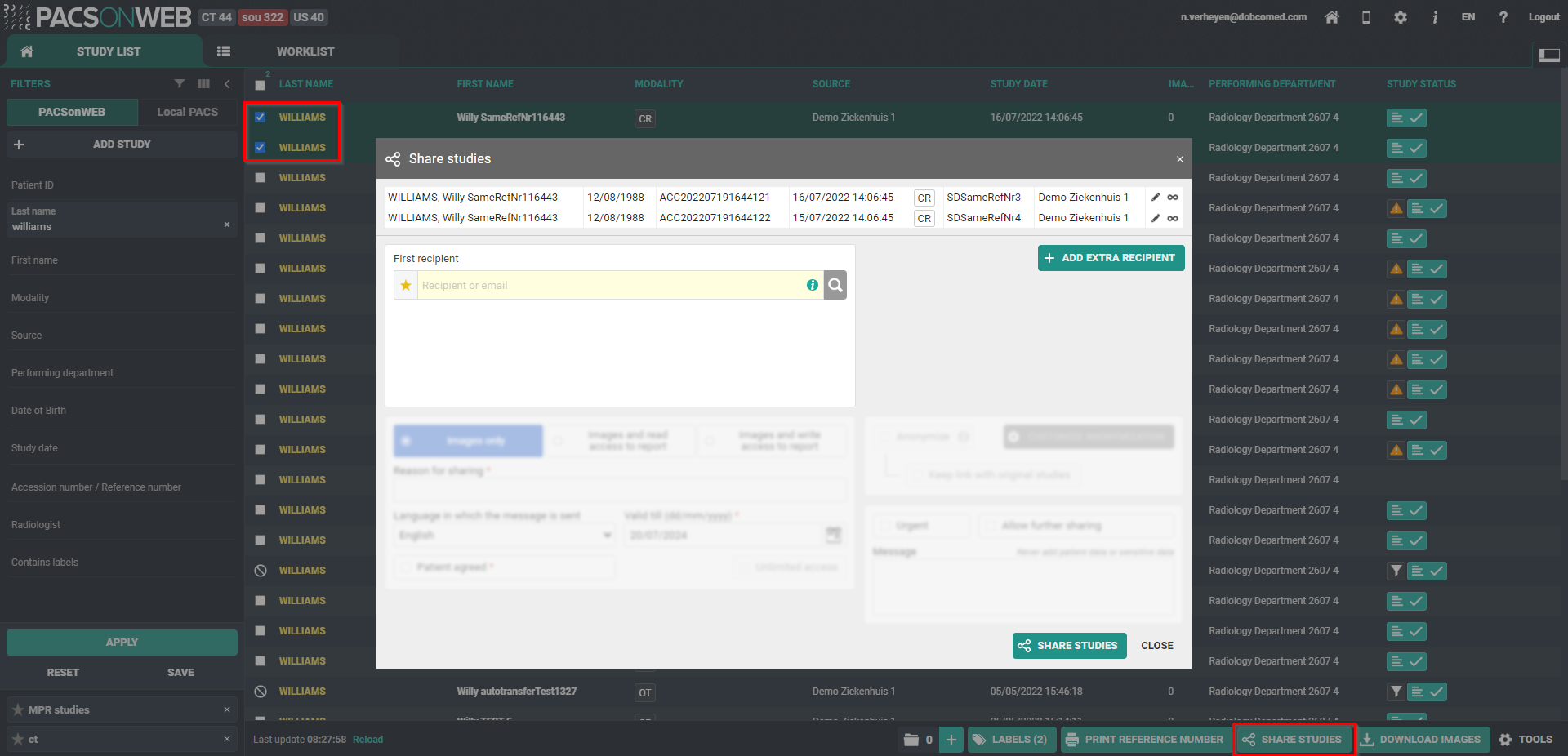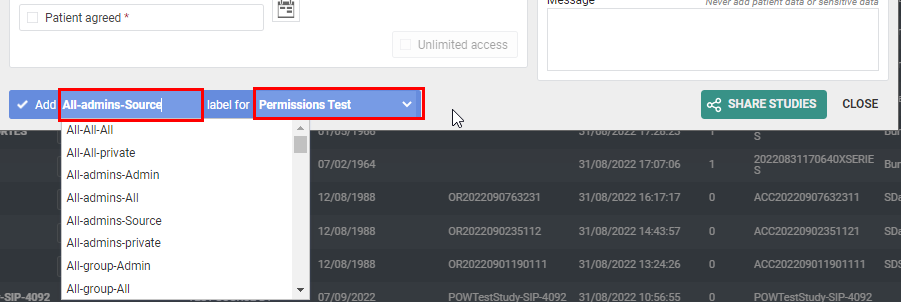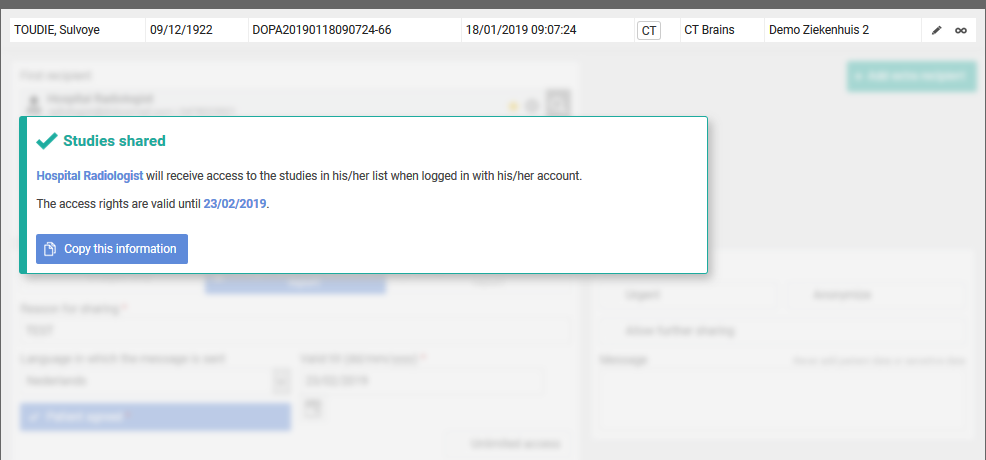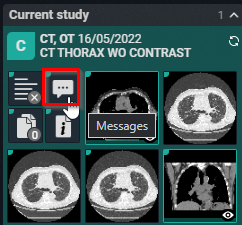Sharing studies with a user
Sharing studies with a user  requires 3 main steps.
requires 3 main steps.
 requires 3 main steps.
requires 3 main steps.1. Selecting the studies to be shared.
2. Adding the recipient(s).
3. Setting the parameters for sharing.
Selecting the studies to be shared
You can share one or multiple studies.
From the study list, select the study or studies you want to share by checking the box next to each study, then clicking  share studies.
share studies.
 share studies.
share studies.
Adding your recipient(s)
There are several ways to add a recipient.
• Favorites: Click the favorites icon  to load your favorites.
to load your favorites.
 to load your favorites.
to load your favorites.◦ To select a recipient from your favorites list, click on the name of the desired recipient.
• Recipient text field: Type the recipient's name or e-mail into the recipient field.
◦ You can search for an existing user, group, PACS or define a new recipient.
◦ You can look up a user by:
▪ First name
▪ Last name
▪ Physician number (RIZIV, BIG, INSEE, HIN, UCGN, PNB ... )
▪ Mobile number (if public)
▪ Email address (if public)
• Detailed search: Click the search icon to conduct a detailed search.
◦ From the detailed search dialog, you can use specific criteria to look up and select the desired user, group or radiology department as recipient.
◦ If you have selected a recipient, you can add the following options:
▪ Two-factor-authentication: If the recipient wants to consult the shared study, a one-time-password will be sent by text message to the registered mobile number and needs to be entered before access is given.
 | Important! If the user enters an incorrect OTP 5 consecutive times, the bucket is locked. The bucket can be unlocked by the Service desk or an admin user of the sending radiology department (see Status Forwarding ) |
▪ Send Mail: The user with whom the study was shared, will receive an email with the following information:
▪ that an exam has been shared
▪ who shared the exam
▪ which exam was shared (patient initials, description of the exam, date of the exam) + a link to open the exam
▪ the message in case this was entered by the sender when sharing
You can add additional recipients by clicking  Add extra recipient.
Add extra recipient.
 Add extra recipient.
Add extra recipient. | Tip: You can add a user to your favorites from the Share studies dialog. Once you have selected a user as a recipient, click the favorites icon. The user will be added to your list of favorites once the share action has been completed. |
Setting parameters for sharing
Before sharing the study, certain perameters must be set.
1. Select the access you want to provide to the recipient. You have the following options:
◦ Images and read access to report
◦ Images and write access to report
◦ Images only
 | Tip: The images only option is not available when sharing with a user. |
2. Register a Reason for sharing.
◦ The reason is not communicated to the recipient but it is a mandatory field and will be registered in DeepUnity PACSonWEB.
3. Select the language used for sending the message.
◦ By default, the language of the first recipient is selected. You can change the language by using the drop-down menu.
 | Important! If you select multiple recipients with different languages, the mail is sent to all recipients using the language of the first recipients. However, if the majority of the recipients share the same language, that language will be selected automatically. |
4. Determine the validity period of access.
◦ By default, the validity period is set to 1 month. You can change this in one of three ways:
▪ Manually enter a new date.
▪ Select a date using the calendar icon.
▪ Select the option Unlimited access.
 | Tip: The default validity period can be configured for each sending radiology department. DeepUnity PACSonWEB offers the possibility to define a default or maximal validity period. The option Unlimited access can also be deactivated on a source level. If specific configuration is desired, please contact the service desk. |
5. Confirm patient consent.
◦ The Patient agreed checkbox must always be checked. The study cannot be shared without the patient’s consent.
6. Add a label.
◦ You can add a label to the study.
◦ To add a label, check the checkbox and select a label from the list. You can add the label for the user or on group level.

7. Optional settings.
◦ Urgent: Adds 'Urgent' to the subject of the related e-mail.
◦ Anonymize: Replaces the name of the patient:
▪ The first name is replaced by a number
▪ The last name is replaced by Anonymous
 | Important! The report for an anonymized study will never be accessible, even if you selected the option Images and read access on the report or 'Images and write access on the report. |
◦ Allow further sharing: Allows the recipient to share the study further with other recipients
◦ Message: If you add a message, it is added to the e-mail that is sent to the recipient. It is visible to the recipient when opening the study in DeepUnity PACSonWEB.
 | Tip: When sharing a study with a user the same values for the following parameters are selected automatically with the next user sharing operation: • Two-factor authentication • Send mail |
After filling out all the required and desired optional information, click share studies.
A pop-up window with the information about the shared study will be displayed, confirming the studies have been shared.

• Copy this information: Use this button to copy the content of the pop-up to your clipboard. You can paste the content into your own e-mail.
• Send e-mail: If this option is checked, the recipient will receive an e-mail with a link to the study and the message that you have shared a study with them.
• The exam will be available in the overview list of the receiver for the time period as entered by the sender.
• If the sender has specified a message this will be indicated on the explore page with a separate label Message.
◦  If the study hasn't been opened yet, the label will be red.
If the study hasn't been opened yet, the label will be red.
 If the study hasn't been opened yet, the label will be red.
If the study hasn't been opened yet, the label will be red.◦  Once the study has been opened, the label turns green.
Once the study has been opened, the label turns green.
 Once the study has been opened, the label turns green.
Once the study has been opened, the label turns green.◦ The message is available within the exam as a separate series.

• Using Share again you can share the same set of studies again with another recipient.